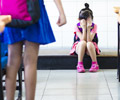New research by King's College London indicates that the negative social, physical and mental health effects of childhood bullying are still evident.

The findings come from the British National Child Development Study which includes data on all children born in England, Scotland and Wales during one week in 1958. The study published today includes 7,771 children whose parents provided information on their child's exposure to bullying when they were aged 7 and 11. The children were then followed up until the age of 50.
Dr Ryu Takizawa, lead author of the paper from the Institute of Psychiatry at King's College London, says: "Our study shows that the effects of bullying are still visible nearly four decades later. The impact of bullying is persistent and pervasive, with health, social and economic consequences lasting well into adulthood."
Just over a quarter of children in the study (28%) had been bullied occasionally, and 15% bullied frequently – similar to rates in the UK today.
Individuals who were bullied in childhood were more likely to have poorer physical and psychological health and cognitive functioning at age 50. Individuals who were frequently bullied in childhood were at an increased risk of depression, anxiety disorders, and suicidal thoughts.
Individuals who were bullied in childhood were also more likely to have lower educational levels, with men who were bullied more likely to be unemployed and earn less. Social relationships and well-being were also affected. Individuals who had been bullied were less likely to be in a relationship, to have good social support, and were more likely to report lower quality of life and life satisfaction.
Advertisement
Bullying is characterized by repeated hurtful actions by children of a similar age, where the victim finds it difficult to defend themselves. The harmful effect of bullying remained even when other factors including childhood IQ, emotional and behavioural problems, parents' socioeconomic status and low parental involvement, were taken into account.
Advertisement
Source-Eurekalert








